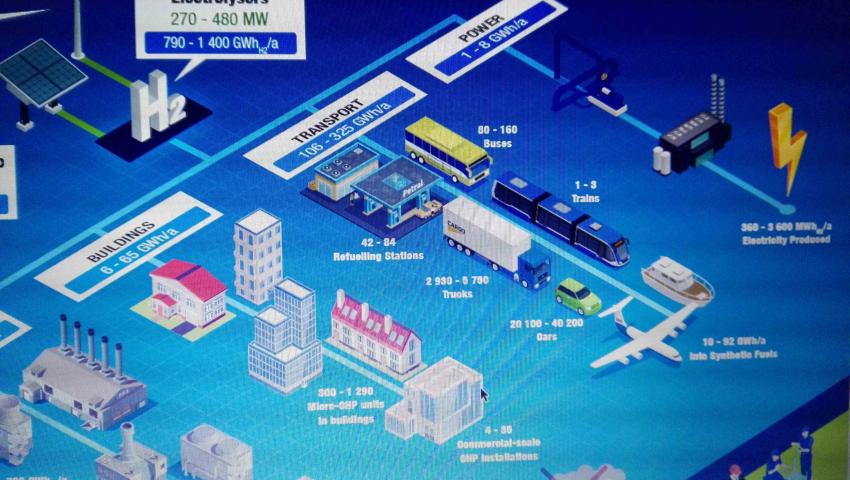Bulgaria's hydrogen strategy relies on renewable energy, hydropower and nuclear energy
The most serious application and demand is expected first in transport and industry

Bulgaria has significant potential for the introduction of hydrogen by 2030. This is indicated by the two scenarios (high and low) for the demand for hydrogen in our country, according to the hydrogen strategy. Moderate demand in transport is assumed, limited in aviation, industry, construction sector.
To cover the expected demand for and replacement of hydrogen in these and other sectors that now rely on fossil fuels in the country, 0.6 to 1.1 GW will have to be installed for renewable energy sources from which green is produced. hydrogen by electrolysis. Part of the demand for hydrogen by 2030 in both scenarios is assumed to still be covered by fossil-based hydrogen produced from fossil fuels. In its national energy and climate plan, the installed capacity in 2030 is estimated at 0.95 GW from wind and 3.2 GW from the sun, generating about 6.7 TWh of renewable electricity from renewable sources (in 2030). - Much, as it is clear from the reading of the document, demand and application of hydrogen is expected in the transport sector, but attention is also paid to the change of the transport infrastructure as a result of the mass entry. Very poor application in heating and cooling. Therefore, for example, the introduction of hydrogen in the construction sector is expected only after 2030.
At the same time, the document states that the technical potential for electricity production from renewable sources in Bulgaria seems to be significantly greater.
The construction of additional renewable capacity for hydrogen production is a feasible scenario, the document suggests. The possibilities for hydrogen production with the help of NPPs are also pointed out quite delicately.
The annual costs of producing green hydrogen (including the cost of renewable energy), developing transport infrastructure (or adapting existing ones) and reaching end users in the scenarios under consideration will reach € 130 and € 230 million respectively. These activities will generate added value in the local economy, including through job creation in the production, construction and operation of hydrogen technologies, and will help reduce greenhouse gas emissions, the document said. According to the European scenario EUCO3232.56, Bulgarian greenhouse gas emissions should be reduced by 18 Mt CO2 in 2030 compared to 2015. In the considered scenarios, the introduction of hydrogen can contribute by 0.3 - 0.4 Mt CO2 to this target, which is equivalent to 1% - 2% of the required emission reductions, is stated in the document.
In addition, it is stated that "excess" electricity generated from solar and wind power will be used to produce hydrogen. Bulgaria expects about 47 GWh of electricity from renewable sources to be used for the production of renewable hydrogen by 2030. To achieve its target for renewable hydrogen, Bulgaria expects a total investment of about 3.45 million euros. A pilot project for hydrogen production with a total installed capacity of 20 MW is planned. On the basis of this project, the further development of the hydrogen capacity after 2030 will be analyzed ", the hydrogen strategy states.
The capability assessment section examines the potential for hydrogen production and its role in the flexibility of the energy system.
The technical potential of the variable energy produced from renewable sources in Bulgaria is 5 times higher than the projected demand for electricity in 2030. The potential of "surplus" in electricity production can be effectively used to produce hydrogen with electrolyzers using renewable electricity. This option would be important as the country has a relatively low interconnection capacity with other EU Member States and therefore fewer opportunities to export its potential electricity surpluses, the report said. According to him, and based on the National Climate and Energy Plan, Bulgaria will use only 4% of the technical potential for renewable electricity generation by 2030, so there is a large reserve for the construction of renewable energy sources, specifically targeted. for hydrogen production.
The existence of nuclear energy production facilities in Bulgaria may represent a concrete opportunity for the deployment of hydrogen, the country's hydrogen strategy says. They are justifiably motivated by the low variable nature of nuclear power plants, which provides the opportunity to use them at full load. This approach will also increase the load factor and hydrogen supply installations and will improve their economic feasibility.
The strategy draws attention to the fact that in the future the production of hydrogen from renewable energy sources will have to compete on the market with the flexible possibilities for the production of electricity from hydroelectric power plants. Bulgaria has a significant installed pumping capacity. However, as is clear from the document, what can be desired in terms of energy infrastructure.
